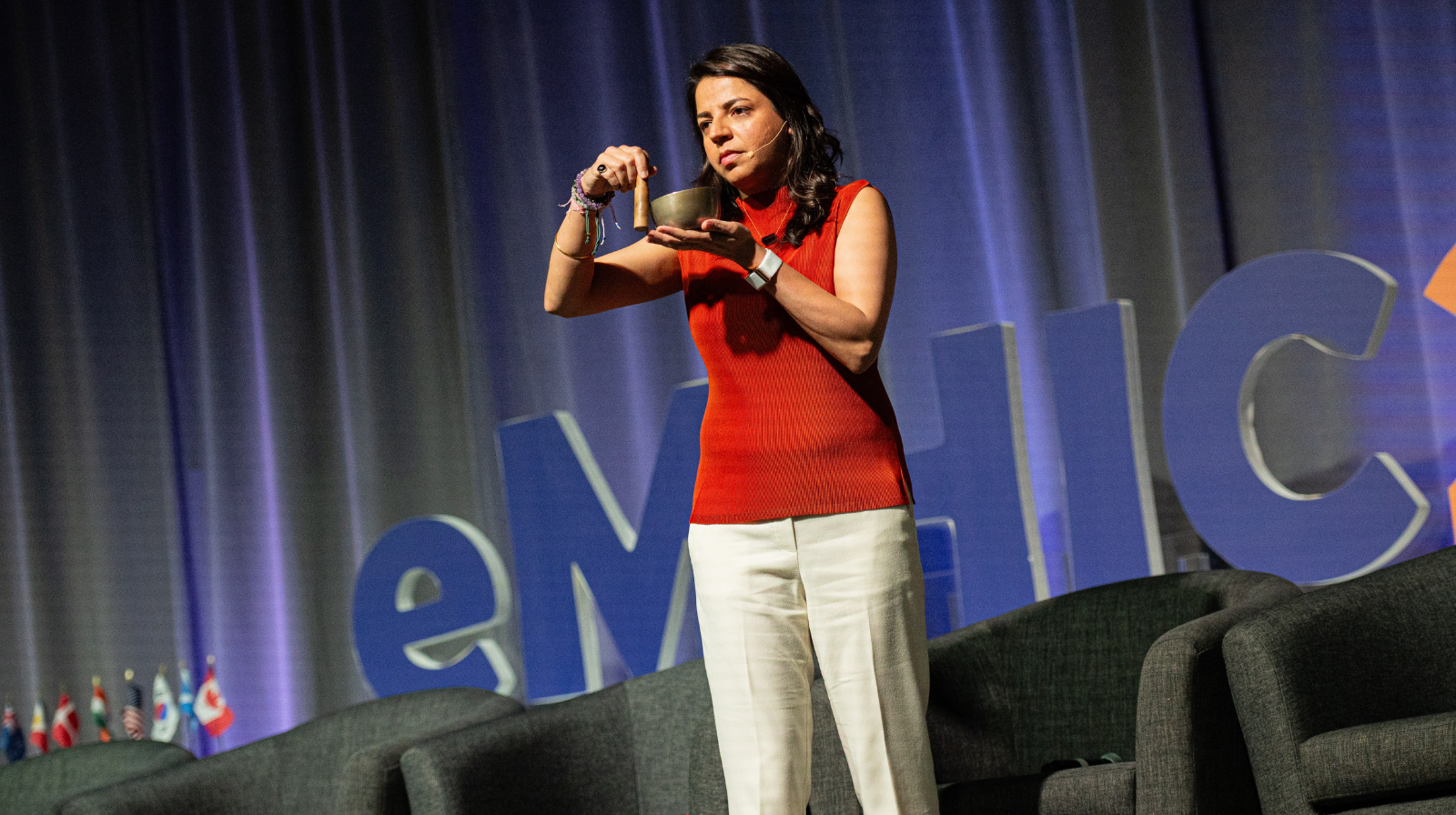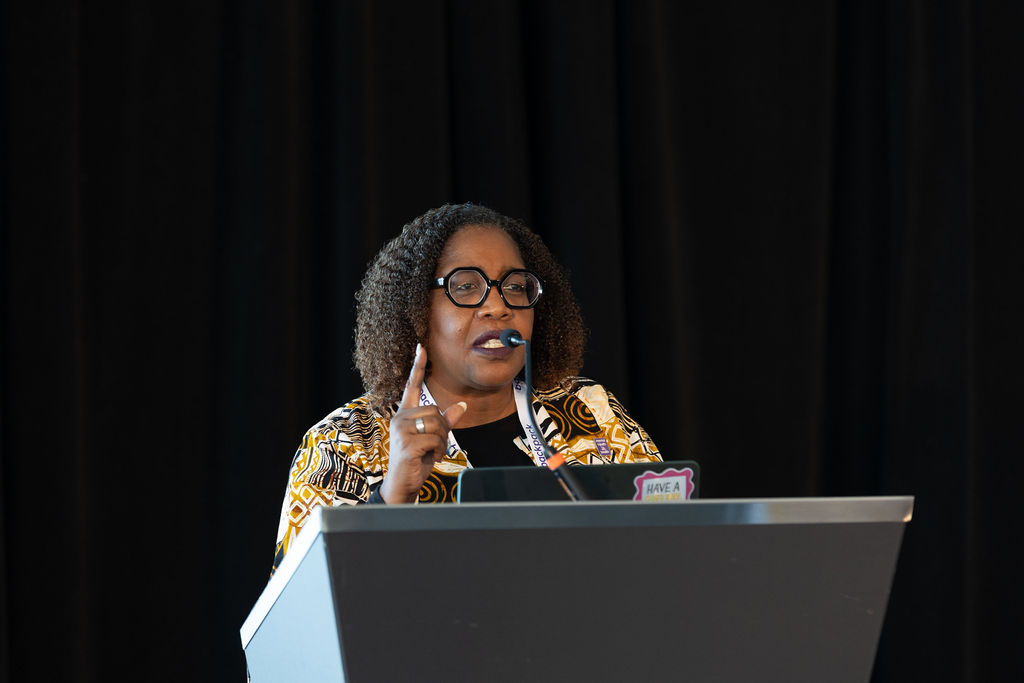Eight Great Ideas Changing Lives Worldwide

Subscribe to Catalyst
Subscribe to get our magazine delivered right to your inbox
Related Articles
Related Articles
Is spirituality back? Can micro-messages delivered via WhatsApp offer measurable improvements on well-being? These, and other ideas, were on the table at the 9th annual Electronic Mental Health International Collaborative (eMHIC) congress, hosted in September in Ottawa by the Mental Health Commission of Canada. Hundreds of delegates from dozens of countries came together to expand their thinking under the theme Digital Building Capacity: 24/7 Mental Health Support for All. The Catalyst team drew selected snack-sized insights and concepts for inspiration.
1. The Big Three
If you’re a young person, this likely comes as no surprise: their top three concerns are jobs, mental health, and climate. This finding from UNICEF guided the development of USupportME, an on-demand psychological support platform for youth. Piloted in several Eastern European and Central Asian countries, the platform is flexible and can be branded for use in different regions. With GDPR compliance and security support, it offers scalable white-label mental health services.
2. Ending the Google Loop of Despair
SANE, an Australian health organization for people with complex mental health issues, coined the term for a familiar cycle: being sent to a website, then a helpline, then a primary care physician, and finally referred to a psychologist—only to face a six-month wait, leading people back to “Dr. Google.” To break this cycle, SANE created a new model of psychosocial support focused on choice, continuity, open access, and quick response. Their approach includes self-referral, telehealth, digital programs, and group sessions, with an Indigenous-governed online learning space in their recovery community. They offer ongoing care, eliminating the traditional discharge model. “The future is in blended care models,” says CEO Rachel Green. It’s tech in service of people.
3. Soul Decisions
“Where did the soul go in clinical psychology?” asks Allan Donsky, a professor in the Department of Psychiatry at the University of Calgary and consultant at the Canadian Institute of Natural and Integrative Medicine (CINIM). He advocates for more contemplative therapeutic practices, beyond strictly diagnosis driven interventions, aimed at fostering self-awareness. Developing inner literacy can help people transition from languishing to flourishing by addressing big questions of self-acceptance, purpose, freedom, and relationships. Donsky notes that existential therapy was largely discarded in the 1970s, but there is a renewed interest in exploring inner dimensions—what might be called the heart, spirit, or soul. “What does it mean to be human?” he asks? It’s a universal question. “Every culture around the world has its ways of contemplating the deeper aspects of life.”
4. Family First
Mental health advocate Nicole Waldron referred to family caregivers as the very first responders. They are first on the scene to help family members, and they are often the unseen link in mental health care. Waldron gave a powerful address calling for better data collection and ecosystem support for family caregivers for their wellness, advocacy, and education. “What does a CTO mean? What does an SDM mean? How do you navigate a system where your loved one has been criminalized?”
(A CTO refers to a community treatment order and an SDM stands for substitute decision-maker).

Credit: eMHIC
5. One-Stop Help
Where to start? When there are so many options to choose from and you need support, what is the first step? Kids Help Phone launched Resources Around Me at the conference. It’s a directory of trustworthy resources from all across Canada. Kids Help Phone had 20 million interactions in 2020, and this directory helps them provide more support in more places and in more ways – virtual, text, in-person, and more.
6. Expressing Emotions in Sign Language
In Bangladesh, there are a total of 500 practitioners – 300 psychiatrists and 200 psychologists – for a population of 180 million – that’s a giant gap to fill. That’s where PhD researcher M Tasdik Hasan of Monash University in Melbourne, Australia, is piloting a project co-designed with deaf people, caregivers, healthcare providers, and sign-language interpreters. He notes deaf communities, in Bangladesh and the world over, are historically ignored when it comes to accessible and inclusive mental health solutions. They co-designed culturally and linguistically tailored tools to provide basic mental health terminology – such as PTSD, stress, and depression – in sign language.
7. Building Capacity in Small and Remote Communities
The ATIPAN Project provides telehealth services to Indigenous communities in the Western Visayas region of the Philippines, where access to healthcare is often limited by distance, challenging terrain (including islands, mountains, and agricultural or coastal areas), armed conflict, language barriers, and financial constraints. To address these challenges, the project implemented community-based patient navigators and infrastructure development over two years. Named after the Hiligaynon word atipan (“to take care of”), the project offers free consultations, training for community coordinators, and basic medications.
8. What’s App with That?
The Pode Falar project provides mental health support to Brazilians aged 13-24 through a website, Instagram, and WhatsApp. It features a chatbot named Ariel, who handles automated triage and offers assistance based on the complexity of users’ concerns. Users can access self-care tips (“I want to take care of myself”), read or share anonymous stories about overcoming challenges (“I want to be inspired”), and connect with a human agent for additional support (“I want to talk”). This large-scale initiative addresses mental health in an under-resourced area and was highlighted in a panel discussion: “Are Low to Middle Income Settings Ready to Benefit from Digital Mental Health Tools?” The program supports text, email, and WhatsApp messaging services.
Steal These Ideas
The congress’ regular sessions titled “Brag & Steal” offer permission to take projects that have worked well elsewhere and apply them to your own work. In that spirit, we want to underline a few cool concepts.
Pop Up Mental Health
Those attending a mental health conference tend to be a niche bunch, so why not bring it to the people? The Time to Change program that ran for 15 years in the UK until 2021 campaigned to reduce stigma through social contact. People with lived experiences of mental health issues had two-way conversations with unknown members of the public to debunk myths about mental illness. They went to concerts, libraries, and farmers’ markets, said Sue Baker, OBE, founder of Time to Change.
Of Sound Mind
Composer, sound artist, producer, and DJ Satya Hinduja, founder of Alchemic Sound Environment, taps into the connection between sound, music, technology, and health. Hinduja led a deep listening experience, designed to invoke states of reflection, receptivity, and exchange. Thinking about sound as a therapeutic experience gave participants a chance to reflect on the noises around them, frequencies, vibrations, and their own interiority.
North Star
There are so many mental health apps out there – how do we know what to trust? At the congress, the Mental Health Commission of Canada released Canada’s First E-Mental Health Strategy. This guiding star document has six priorities and 12 recommendations to chart the future direction and development of e-mental health in Canada. Use it to advocate, guide, and develop your work.
Narrative Care
Step by Step is a web application used in Lebanon that provides mental health support through storytelling. In the program, fictional characters with depression visit a healthcare worker, and users learn coping skills from a 15-minute illustrated story, observing how the character applies these techniques in their life. The second 15-minute segment is interactive, with the healthcare professional character delving deeper into therapeutic techniques and offering activities for users to reinforce what they’ve learned.
Overheard at eMHIC
- On getting things done: The words “collaborative action” – shortened to “collaboraction” was the name of the game – working together to advance mental health access.
- Beyond shiny objects: It’s not about technology per se, rather, “it’s about people and trust.” The tools enable this work and digital has no geopolitical boundaries.
- Making space for our work: Ian Hickie, professor of psychiatry, Brain and Mind Centre, University of Sydney, Australia, talked about “the Uberization of mental health.” If those with lived experience and research capacity in this field don’t respond appropriately, it leaves room for others to step in to respond consumer priorities: access, choice, competitive pricing, user experience. Worldwide, demand for personalized mental health services far outstrips supply.
- The meaning of it all: “We all get lifted when someone believes in us,” said eMHIC executive director, Anil Thapliyal, in his closing comments.
Coming up: The 10th annual congress takes place in Toronto, November 2025. Register your interest and learn more at: https://events.emhicglobal.com/register-your-interest-for-emhic-2025/
Further reading: Tech Support: Online mental health support is breaking down barriers.